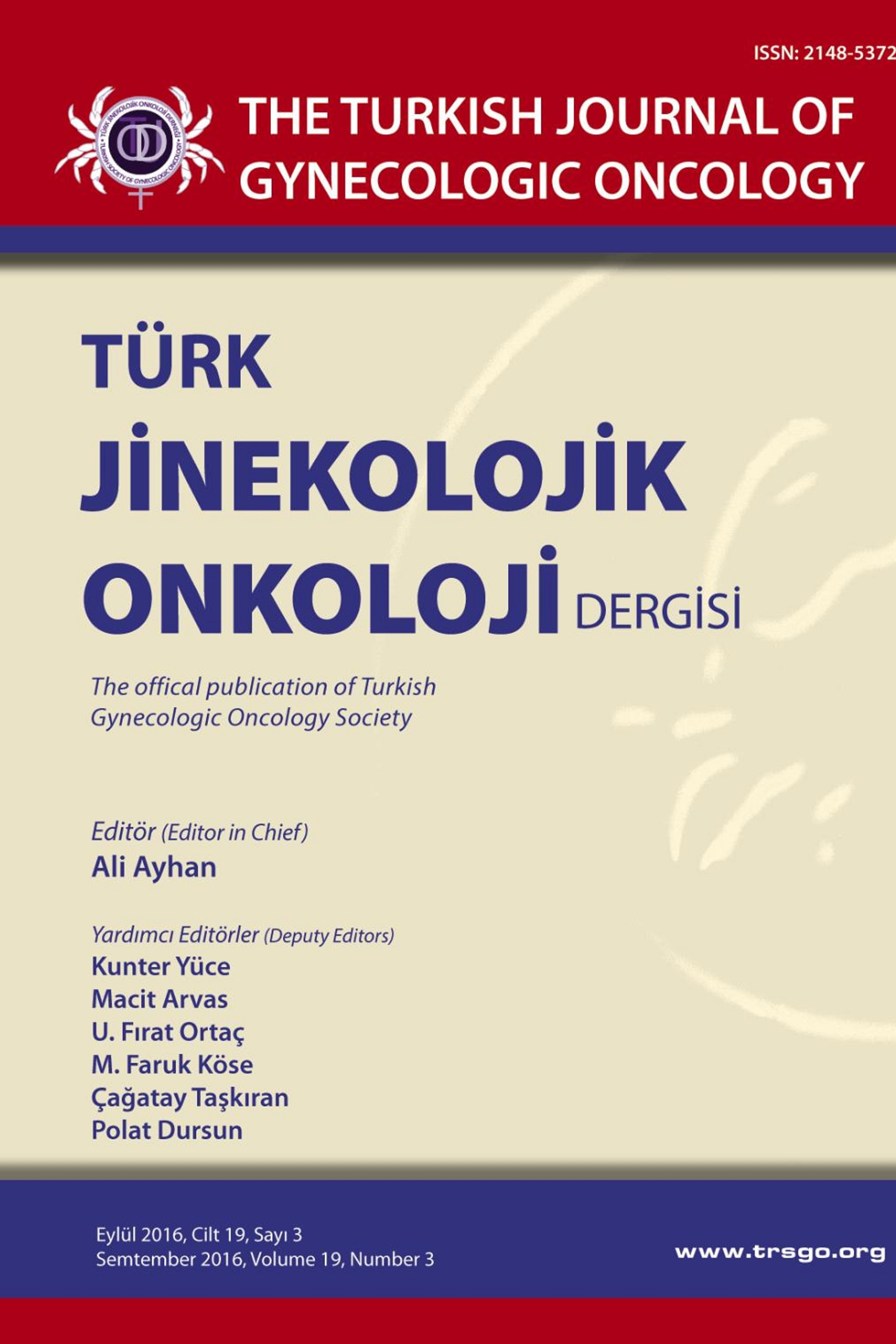Gestasyonel Trofoblastik Hastalıklarda Histerektominin Rolü
Gestasyonel trofoblastik hastalıklar, histerektomi
The Role Of Hysterectomy In Gestational Trophoblastic Disease
Gestational Trophoblastic Disease, Hysterectomy,
___
- 1. Ozalp SS, Yalçin OT, Tanir HM. Hydatidiform mole in Turkey from 1932 to 2000.. Int J Gynaecol Obstet. 2001 Jun;73(3):257-8.
- 2. Ozalp SS, Telli E, Oge T, et al. Multicenter analysis of gestational trophoblastic neoplasia in Turkey. Asian Pac J Cancer Prev. 2014;15(8):3625-8.
- 3. Zhao P, Chen Q, Lu W. Comparison of different therapeutic strategies for complete hydatidiform mole in women at least 40 years old: a retrospective cohort study. BMC Cancer. 2017 Nov 9;17(1):733.
- 4. Eysbouts YK, Massuger LFAG, IntHout J, et al. The added value of hysterectomy in the management of gestational trophoblastic neoplasia. Gynecol Oncol. 2017 Jun;145(3):536-542.
- 5. Doll KM, Soper JT. The role of surgery in the management of gestational trophoblastic neoplasia. Obstet Gynecol Surv. 2013 Jul;68(7):533-42. Review.
- 6. Fang J, Wang S, Han X, et al. Role of adjuvant hysterectomy in management of high-risk gestational trophoblastic neoplasia. Int J Gynecol Cancer. 2012 Mar;22(3):509- 14.
- 7. İbrahim Egemen Ertaş, Aşkın Doğan, Volkan Emirdar, ve ark. Gestasyonel Trofoblastik Neoplazilerin Tedavisinde Histerektominin Rolü: Tek Merkezin 17 Yıllık Deneyimi. Türk Jinekoloji ve Obstetrik Derneği Dergisi, 2012; Cilt: 9 Say›: 2 Sayfa: 110- 5
- 8. Hanna RK, Soper JT. The role of surgery and radiation therapy in the management of gestational trophoblastic disease. Oncologist. 2010;15(6):593-600.Review.
- 9. Fülöp V, Szigetvári I, Szepesi J, et al. The Role of Surgery in the Management of Gestational Trophoblastic Neoplasia The Hungarian Experience. J Reprod Med. 2016 May-Jun;61(5-6):197-204.
- 10. Eoh KJ, Chung YS, Yim GW, et al. Role of surgical therapy in the management of gestational trophoblastic neoplasia. Obstet Gynecol Sci. 2015 Jul;58(4):277-83.
- 11. Giorgione V, Bergamini A, Cioffi R, et al. Role of Surgery in the Management of Hydatidiform Mole in Elderly Patients: A Single-Center Clinical Experience.Int J Gynecol Cancer. 2017 Mar;27(3):550-553.
- 12. Sun SY, Melamed A, Joseph NT, et al. Clinical presentation of complete Hydatidiform mole and partial Hydatidiform mole at a regional Trophoblastic disease Center in the United States over the past 2 decades. Int J Gynecol Cancer. 2016;26(2):367–70. 13. Curry SL, Hammond CB, Tyrey L, et al. Hydatidiform mole: diagnosis, management, and long-term followup of 347 patients. Obstet Gynecol. 1975;45(1):1–8.
- 14. Savage PM, Sita-Lumsden A, Dickson S, et al. The relationship of maternal age to molar pregnancy incidence, risks for chemotherapy and subsequent pregnancy outcome. J Obstet Gynaecol.2013;33(4):406–11. 15. Pisal N, North C, Tidy J, Hancock B. Role of hysterectomy in management of gestational trophoblastic disease. Gynecol Oncol. 2002 Nov;87(2):190-2.
- 16. Soper JT. Role of surgery and radiation therapy in the management of gestational trophoblastic disease. Best Pract Res Clin Obstet Gynaecol. 2003 Dec;17(6):943- 57.
- 17. Lang JF, Childers JM, Surwit EA. Laparoscopic hysterectomy for persistent gestational trophoblastic neoplasia. J Am Assoc Gynecol Laparosc. 1995 Aug;2(4):475-7.
- 18. Riley K, Newell J, Zaino R, Kesterson J. Robotic-assisted Laparoscopic Management of Chemoresistant Myoinvasive Complete Molar Pregnancy. J Minim Invasive Gynecol. 2015 Sep-Oct;22(6):1100-3
- 19. Wang Q, Fu J, Hu L, et al. Prophylactic chemotherapy for hydatidiform mole to prevent gestational trophoblastic neoplasia. Cochrane Database Syst Rev. 2017 Sep 11;9:CD007289.
- 20. Horowitz NS, Goldstein DP, Berkowitz RS. Placental site trophoblastic tumors and epithelioid trophoblastic tumors: Biology, natural history, and treatment modalities. Gynecol Oncol. 2017 Jan;144(1):208-214
- ISSN: 2148-5372
- Başlangıç: 2014
- Yayıncı: Türk Jinekolojik Onkoloji Derneği
Epitelyal Over Kanserinde Retroperitoneal Lenf Nodu Metastazı Etkileyen Faktörlerin Araştırılması
Hediye DAĞDEVİREN, Ali İsmet TEKİRDAĞ, Özgür AKBAYIR
Uterin Kama Rezeksiyonu ile Tedavi Edilen Overin Seks Kord Tümörüne Benzeyen Uterin Tümör Vakası
Duygu Altın, Salih TAŞKIN, Fırat Ortaç
Adenomyozis Odağından Kaynaklanan Uterusun Adenofibromu: Oldukça Nadir Bir Lokalizasyon
Pembe Oltulu, Kazım Gezginç, Gülşah Orkan
